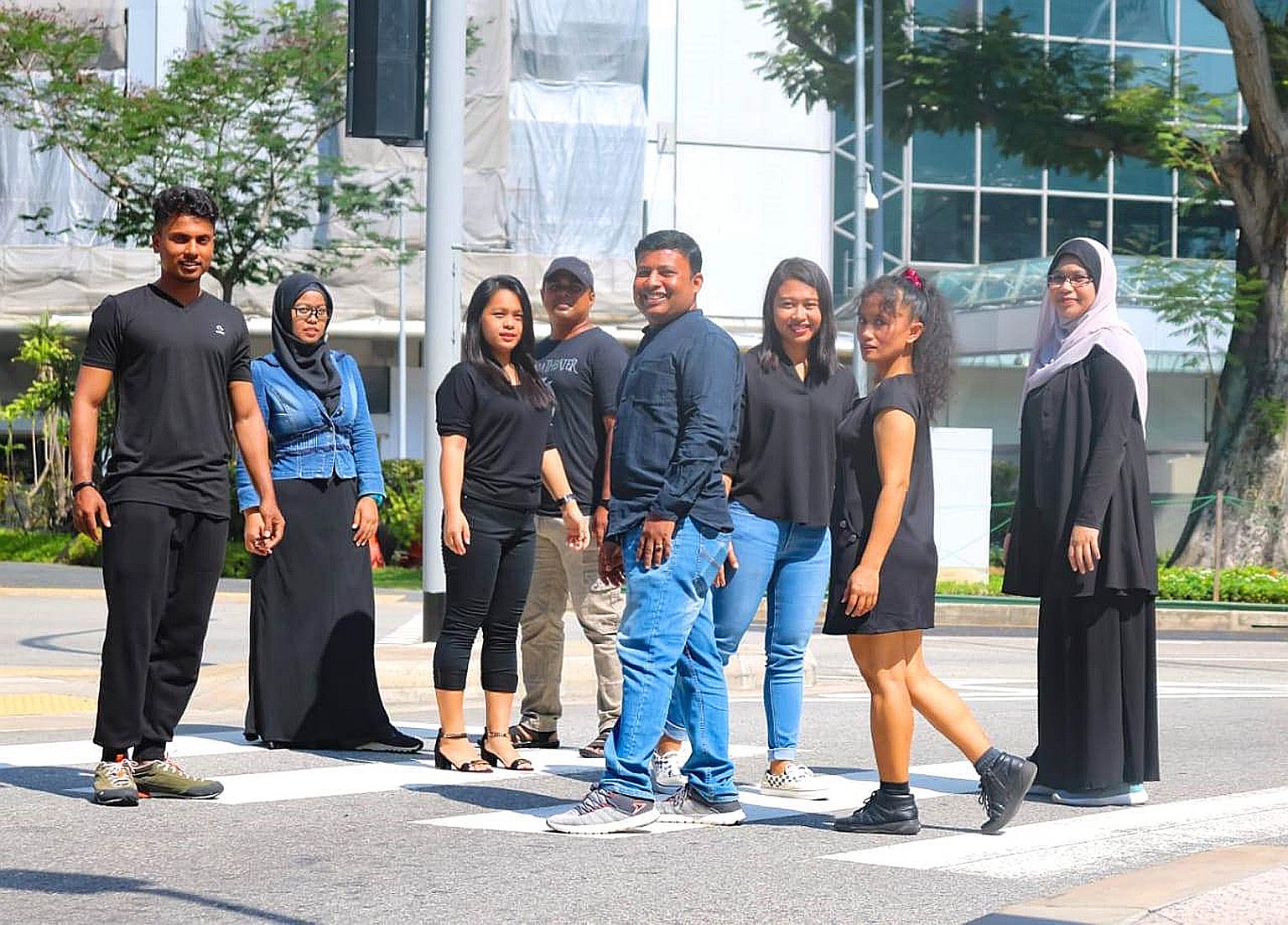Burgeoning scene blossoms into migrant literature festival
About 200 attend inaugural event featuring literary works of foreign workers in S'pore
Sign up now: Get ST's newsletters delivered to your inbox

Mr Zakir Hossain Khokan (centre), founder of literary interest group Migrant Writers of Singapore, with performers at a rehearsal of Zebra Crossing. The poetic play, written and performed by migrant workers, was part of the festival yesterday.
PHOTO: ICHA
A literature scene here of foreign workers penning stories and poems has blossomed into Singapore's first migrant literature festival.
About 200 people turned up yesterday at the National Library for the inaugural migrant literature festival featuring the literary works of migrants here. Poet Boey Kim Cheng, an associate professor at the Nanyang Technological University, was the guest of honour.
The event saw the launch of four new books written by migrant workers here, performances on stage, and a panel discussion in which the future of writing by migrant workers in Singapore was explored.
There was also a screening of the first independent short film by migrants in Singapore. The 15-minute film, Salary Day, was directed by and stars Mr R. Madhavan, a migrant worker from Tamil Nadu.
There were 1.4 million foreigners working here as of June, according to Ministry of Manpower data. They include 255,800 domestic helpers, 284,300 construction workers on work permits and 189,000 employment pass holders.
Mr Zakir Hossain Khokan, 41, founder of literary interest group Migrant Writers of Singapore (MWS) which organised the festival, said the event aims to introduce Singapore's reading audience to the migrant literary scene here, and the opportunities and challenges the community has met with as it grew over the years.
Most of the early works were by Bengali writers, such as the anthology of poems called Migrant Tales. There were also some books published by domestic workers.
The Bengali migrant literature scene started in 2004, with a writing interest group named "Amrakajona" in Bengali, meaning "We are".
However, the migrant literary scene started becoming more active after the first migrant worker poetry competition was held in 2014. That was when migrant workers hailing from different countries were exposed to one another's writings.
In recent years, migrant writers have been featured more prominently in public, such as in the Singapore Writers Festival. Among them is Mr Zakir, who left his job as a freelance journalist in Dhaka in 2003 to work in construction here. He said: "I have always wondered how it would be, if Singapore could spearhead a global initiative where migrant workers could share their own literary talent and writings."
An unusual anthology, Call And Response, was published last year, taking Singapore's burgeoning migrant worker poetry scene a step further by pairing works of more than 30 migrants - the bulk of them low-wage transient workers - with poems written in response by Singaporeans.
Beyond showcasing migrant literary talents, MWS has also been using literature as a tool for better communication and understanding.
Said Mr Zakir: "Being in a foreign land, feelings of loneliness are unsurprising... We hope to continue bonding the community and create more platforms for migrants to connect with locals."
The day-long festival programme also included local writers who wrote stories about their own migrant origins or stories about other migrant workers they interact with.
MWS hopes to address deeper issues in the migrant community, such as mental health, in future. The festival featured a workshop by author Rahul Shah where migrants and locals learnt about how writing can improve mental health.
The festival comes days after survey results released last Wednesday to mark International Migrants Day showed some resistance to migrant labour in Singapore, although attitudes were less negative than in neighbouring countries.
The survey of four Asian countries by the International Labour Organisation and United Nations Women found just one in four Singaporeans said there is a need for migrant workers, even though seven in 10 agreed there is a labour shortage here.
Underscoring some resistance to migrant labour, more than half of the 1,005 Singaporeans surveyed also believed crime has increased and the country's culture and heritage have been threatened because of migrant workers.
The findings are in line with those in Japan, Malaysia and Thailand, the other countries surveyed. Positive attitudes towards migrant workers have declined over the last decade even as migration has increased overall, said the report.
Still, Singaporeans have a more positive view of migrant workers compared with those in the other countries, with more seeing migrant workers as having an overall positive net effect on the national economy.
Yesterday, five migrant workers also participated in the Human Library programme segment of the festival, where they shared their life stories and lived experiences to selected members of the public who were free to ask them questions.
The workers included Ms Shy Lhen Esposo, a domestic helper from the Philippines who is also a self-published writer, storekeeper Belal Hasan from Bangladesh, who organises migrant literature events in Singapore, and photographer Jean E. Ragual from the Philippines, who was a winner of the 2019 Migrant Workers Photography Festival and a finalist in the 2017 Migrant Worker Poetry Competition.
The festival was supported by the Humanitarian Organisation for Migration Economics and the National Library Board, and sponsored by local literary non-profit Sing Lit Station.
Said Ms Esposo: "I am amazed that we can have this kind of festival... to let others know that we not only work hard here but also have other talents to share with everyone."


